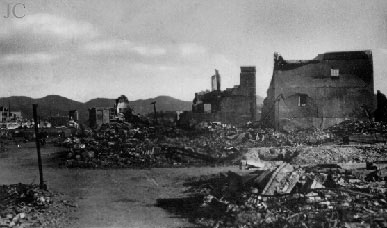 Suddenly --- the time is approximately 8:15 -- the whole valley is filled by a garish light which resembles the Magnesium light used in photography, and I am conscious of a wave heat. I jump to the window to find out the cause of this remarkable phenomenon, but I see nothing more than that brilliant yellow light. As I make for the door, it doesn't occur to me that the light might have something to do with enemy planes. On the way from the window, I hear a moderately loud explosion which seems to come from a distance and, at the same time, the windows are broken in with a loud crash. There has been an interval of perhaps ten seconds since the flash of light. I am sprayed by fragments of glass. The entire window frame has been forced into the room. I realize now that a bomb has burst and I am under the impression that it exploded directly over our house or in the immediate vicinity. I am bleeding from cuts about the hands and head. I attempt to get out of the door.
Suddenly --- the time is approximately 8:15 -- the whole valley is filled by a garish light which resembles the Magnesium light used in photography, and I am conscious of a wave heat. I jump to the window to find out the cause of this remarkable phenomenon, but I see nothing more than that brilliant yellow light. As I make for the door, it doesn't occur to me that the light might have something to do with enemy planes. On the way from the window, I hear a moderately loud explosion which seems to come from a distance and, at the same time, the windows are broken in with a loud crash. There has been an interval of perhaps ten seconds since the flash of light. I am sprayed by fragments of glass. The entire window frame has been forced into the room. I realize now that a bomb has burst and I am under the impression that it exploded directly over our house or in the immediate vicinity. I am bleeding from cuts about the hands and head. I attempt to get out of the door.I post this particular account because it's well written, but more important, he includes some reflections on the moral questions at hand. The account concludes:
We have discussed among ourselves the ethics of the use of the bomb. Some consider it in the same category as poison gas and were against its use on a civil population. Others were of the view that in total war, as carried on in Japan, there was no difference between civilians and soldiers and that the bomb itself was an effective for tending to end the bloodshed, warning Japan to surrender and thus to avoid total destruction. It seems logical to us that he who supports total war in principle cannot complain of a war against civilians. The crux of the matter is whether total war in its present form is justifiable, even when it serves a just purpose. Does it not have material and spiritual evil as its consequences which far exceed whatever the good that might result ? When will our moralists give us a clear answer to this question?
These questions are still worth pondering now, especially today as war seems to be on the increase, and peace-making is hardly given serious consideration in our national discourse any more.
The bombs in Hiroshima and Nagasaki undoubtedly transformed our world. Can we respond in fervent hope, like Sadako Sasaki, and transform the world into a place where war is no longer known?
No comments:
Post a Comment